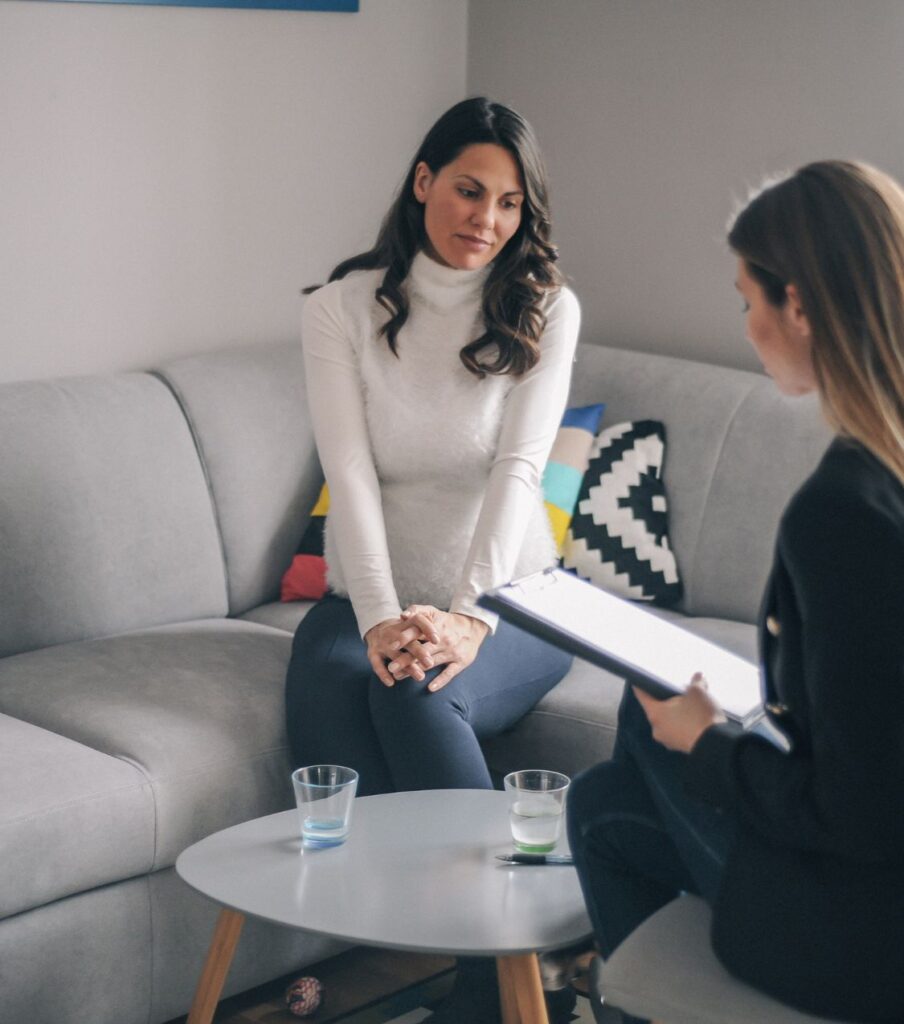When infidelity occurs in a relationship, it’s not just the act of betrayal that shakes the foundation—it’s the aftermath, the fallout, and the way we interpret and navigate through it all. Have you ever stopped to consider bias in the aftermath of infidelity? These biases color our perceptions, decisions, and actions in the wake of relationship betrayal.

From societal norms to personal experiences, biases can shape our understanding of infidelity. Our one-sided perceptions have a way of influencing our judgments and impacting the way we approach healing and reconciliation. And yes, those biases can also extend to our therapists, the very ones who are supposed to guide us through the healing process.
Someone with an interesting point of view on this topic is a member of our clinical team, Alana Tokayer. She is a therapist who works with couples surviving infidelity as well as our program specialist. It is her job to interview couples for our infidelity recovery program. As such, she gets to hear prospective couples’ journeys early on.
Together, Alana and I explored the nuances of bias in the aftermath of infidelity and uncovered how awareness and reflection lead to greater clarity and healing in our relationships. We also discussed, and share below, important tips on advocating for yourself in this matter.
EXPLORING PUBLIC BIAS IN THE AFTERMATH OF INFIDELITY
Q: Alana, how is your perspective unique regarding bias in the aftermath of infidelity?
My perspective on this topic comes from a few angles. First as a therapist who specializes in infidelity. As such I work with couples in the aftermath of infidelity every day. I am also the program specialist for our infidelity recovery program, It’s Okay to Stay.
I interview couples from all over the world who are in the aftermath of infidelity and are interested in the program. The first part of that interview is dedicated to learning about the couple’s experience. This is often when I hear about biases they’ve encountered from people around them and from therapists. I also enjoy doing speaking engagements on infidelity, including guest lectures for therapists in training. So, I have a unique window into the minds of up-and-coming professionals.
Q: What have you noticed about bias from those different perspectives? What do people say?
There is so much bias when it comes to infidelity. Infidelity is one of those things where everyone walks around thinking to themselves, “If I’m ever cheated on, I know exactly what I’d do: I’d leave. I would never stay with someone who cheats on me.”

People walk around with this mind frame. But, the truth is, no one really knows what they’d do until they are in this situation. Until they’ve actually been cheated on by someone they love, someone they have a long history with or a family with, no one knows what they’d do.
Still, everyone thinks they know what they’d do. This is the problem because if everyone thinks they know what they would do, then they think they know what you should do.
And thus, we have bias. And it’s usually a bias towards leaving…towards an inability to truly heal. Couples in the aftermath of infidelity face this partiality from family, friends, coworkers, the world at large.
In fact, to highlight how pervasive this bias is, I wanted to share a story about a client who had been betrayed by her partner. Moments after she found out her husband’s cheating, she went on social media and posted in a mom’s Facebook group. She wrote, “Oh my god my husband has been cheating on me with his admin – can you believe it??”
She was so blindsided and angry she wanted to shout it from the rooftops. What happened next was interesting. She received tons of comments on her post from women telling her: “Run!”, “Leave! He’ll never change!”, and “You deserve better.”
Yet, at the same time, she received just as many private messages from women telling her: “Work through it.”, “Healing is possible”, and “I’ve been there, we’re doing great!”
What this highlights is so important. Publicly, people say leave and privately people say it’s okay to stay. Bias and stigma around infidelity are totally at play here. Keep in mind how skewed the internet and public notions are.
Q: What concerns feed off this bias for couples coping with infidelity?
There are several according to Alana. They may sound like this:
- Is it true that once a cheater… Can a tiger change its stripes?
- Can I (hurt partner) maintain dignity and choose to stay?
- What does staying even look like? Is it even possible to truly heal? Or does a couple who stays together just look the other way?
I noted that when cheating occurs, therapists commonly advise partners to terminate the relationship OR they urge them to accept a superficial form of forgiveness. As a therapist, I’m deeply uncomfortable with this perspective and do not believe these are the only solutions.
EXAMINING THERAPIST BIAS IN THE AFTERMATH OF INFIDELITY
Q: If these issues exist for everyone, shouldn’t therapists be aware of their own bias?
Exactly. While many of us are aware that when talking to friends and family, bias will likely exist. However, we may not be aware that when we walk into a therapy room and spill our guts, the therapist‘s bias may be present.

So what could happen? A couple or an individual is in the aftermath of infidelity – their heads are spinning, they don’t know which way is up. They are in dire need of a guiding light, so they get themselves into therapy. Good! But not if they find themselves in a therapy room with a biased therapist.
It is so important to talk about what we’ve seen among therapists.
Q: Why is it so important to understand that bias exists among therapists?
Therapists have such an immense ability to influence people. Couples come to therapy in the aftermath of infidelity, not knowing what to do. They are so incredibly vulnerable.
There’s a John Lennon song I often think about in our work. It goes, “How can I go forward when I don’t know which way I’m facing.” This really captures how a person feels in the aftermath of infidelity. Their life has just been flipped upside down.
So, people come to therapy needing to be reoriented. They need help getting their bearings. They need direction. Often, their sense of coherency has been erased and their judgment shattered. Therapists do hold a lot of power for a couple or individual intent on surviving infidelity.
By the way, this isn’t a knock on therapists. We are not robots, we’re human beings with life experiences. Still, it can be a problem if a therapist is unaware of his or her own bias. Or, if they think it won’t impact the therapy process. Or worse, if a therapist intentionally imposes his/her bias in the therapy room.
SURVIVING INFIDELITY: 5 BIASES THAT EVEN THERAPISTS MUST KEEP IN MIND
I asked Alana to share some of the specific biases she’s encountered regarding infidelity. Be mindful of these biases when selecting a therapist.
1. “Once a cheater always a cheater.”
This is possibly the most pervasive bias. Essentially, the idea is that a tiger doesn’t change its stripes. Is it possible that someone who has cheated will cheat again? Sure.
It’s also very possible that someone who has cheated, or even who has cheated multiple times, is at a point where they’re ready to put in the work, explore “their why”, and truly change. People can change. It happens every day. Any therapist who thinks otherwise is in the wrong profession. That’s what we help people do, all the time.
2. A couple can’t actually heal from infidelity.
The idea is that those who stay together just “choose to move on.” This is true for many couples who stay together but don’t actually move through the healing steps. However, for couples that want to heal, and have a pathway for healing, recovery is possible. What does healing mean? It means the hurt partner has a space to express the depths of his or her pain. It means the unfaithful partner hears and validates that pain without defensiveness. Trust can be earned back. Eventual forgiveness can be reached. Most importantly, the couple can come out of infidelity connected with skills that protect their relationship.
That’s healing. And it is absolutely achievable with proper guidance and tools.
3. If a hurt partner stays it means he or she is ok with the betrayal.
No, choosing to heal the relationship isn’t condoning or justifying the cheating. Cheating is not ok, but it doesn’t have to mean the end of the relationship. It can mean the end, and that’s ok too. But it doesn’t have to. Healing, working through and even understanding infidelity, is NOT the same as condoning it.

4. A hurt partner cannot choose to work on the relationship and maintain their dignity/ self-respect.
In other words, the only way to hold on to your dignity and self-respect is to leave. This one is so damaging to a hurt partner. To think that being open to healing means he or she lacks self-respect or is afraid of leaving! Choosing to work through infidelity and heal a relationship can be a dignified, respectable, and courageous decision.
5. Therapist discomfort and/or lack of expertise regarding infidelity.
Less of a bias and more of a general fear, we often hear about therapists who gloss over the infidelity and push couples to work on underlying relationship issues before they’re ready. They essentially ignore the elephant in the room. Some therapists pressure a hurt partner to make a choice (what do you want to do: forgive or end the relationship?). Yet, that may be exactly what that partner or the couple needs help navigating.
Your therapist’s job is to show a couple open to healing what recovery could look like. To create a space for
- the hurt partner’s pain to be heard,
- guidance on how to express the hurt partner’s pain
- how to put words to something that feels unspeakable without lashing out
- helping the unfaithful partner be a compassionate listener, validate the pain, and express remorse in ways felt by their hurt partner.
This is how the therapist should help. Obviously, a therapist should not throw his/her hands up and say, “I can’t help you until you decide what you want to do.”

I believe today’s topic is an absolute game-changer. I could not be more thrilled that we’re tackling it head-on. Let’s explore how to advocate for yourself.
SURVIVING INFIDELITY: HOW TO ADVOCATE FOR YOURSELF WITH FRIENDS, FAMILY… AND YOUR THERAPIST
Alana has some actionable tips to help you combat bias in the aftermath of infidelity. After all, everyone has an opinion but no one is living your life. You are the expert on your life. As such, you should know how to confidently advocate for what you need in terms of support.
5 Self-Advocating Tips For Overcoming The Infidelity Bias of Others
1. Tell them what you need.
Whether it’s to your therapist, friends, or family, speak up. Do you need a space to share your pain or a shoulder to cry on? Do you need support, someone to get you out of bed, take you on a walk, and help you think through what to do next? Ask for what you need.
2. Tell them what you don’t need.
It’s okay to say, “ I don’t need you to tell me what to do, I don’t need lectures, and ‘I told you so’s.’” It’s just fine to tell them, “I don’t need you to tell me what a horrible person my partner is and I don’t need you to tell me to run for the hills.”
3. Clarify your position as the hurt partner.
Make it plain that you are choosing to see if healing is possible. You are not committing to staying no matter what. A lot of people don’t understand that an openness to the healing process is not the same as an unequivocal commitment to stay in the relationship. If you feel like this needs to be explained, explain it.
4. Remove yourself from unhealthy environments.
This applies to in-person interaction too. Be very selective about who you tell about your relationship. Limit time in internet groups/forums where people can become unhinged and say whatever they want. Keep in mind that the internet and social media are highly skewed towards leaving infidelity.
Neither forum is reliable. Again, they are not representative of what people actually do. Why? Because people who leave are for more likely to talk about it openly than those who stay. What you see out there virtually is not an accurate reflection of how people recover in the aftermath of infidelity.
5. Find a therapist who specializes in infidelity recovery.
Make sure you seek out an actual therapist. There are lots of unqualified people giving advice on survivng infidelity. Read their website – do they mention infidelity? What do they say about it? Ask for a phone consultation so you can get a feel for them.
Be sure about their experience with affair recovery too. Learn about their methods. Do they have a solid approach? Remember, infidelity is a specialty, you want an affair recovery specialist.
I want to express my gratitude to Alana for her help exploring bias in the aftermath of infidelity. I’m hopeful that you have some valuable tools to advocate for your healing journey after experiencing infidelity. Trust me, I’ve witnessed numerous couples navigate this intricate path. I wholeheartedly believe that you have the power to communicate your needs, even to your therapist. And remember, if they aren’t listening, don’t hesitate to seek out someone who will.
THE BOTTOM LINE? SURVIVING INFIDELITY AND BIAS in the aftermath of infidelity IS POSSIBLE
Reach out to our professional affair recovery group at Relationship Experts in which we effectively serve couples just like you. We can help guide you through the issues that matter to you and support your growth as a team. Our practice furnishes many programs, help, and support. Please consider our online alternatives whenever you like.
Our useful infidelity recovery coaching program is the healing you’ve been looking for.
These easy steps will connect you as soon as possible:
- Schedule a complimentary 45-minute consult.
- Speak with a program specialist. Talk through our Recovery Program together.
- Start recovering from betrayal with our team!
MORE VALUABLE CARE FROM RELATIONSHIP EXPERTS
Our group at Relationship Experts offers services built to help you both recover and grow. This relationship private practice, founded in the US, operates in Miami, Florida. Our assistance is attainable online as well. Connect digitally in the United States, Canada, or the United Kingdom. Please learn more on our blog page.
Comments +